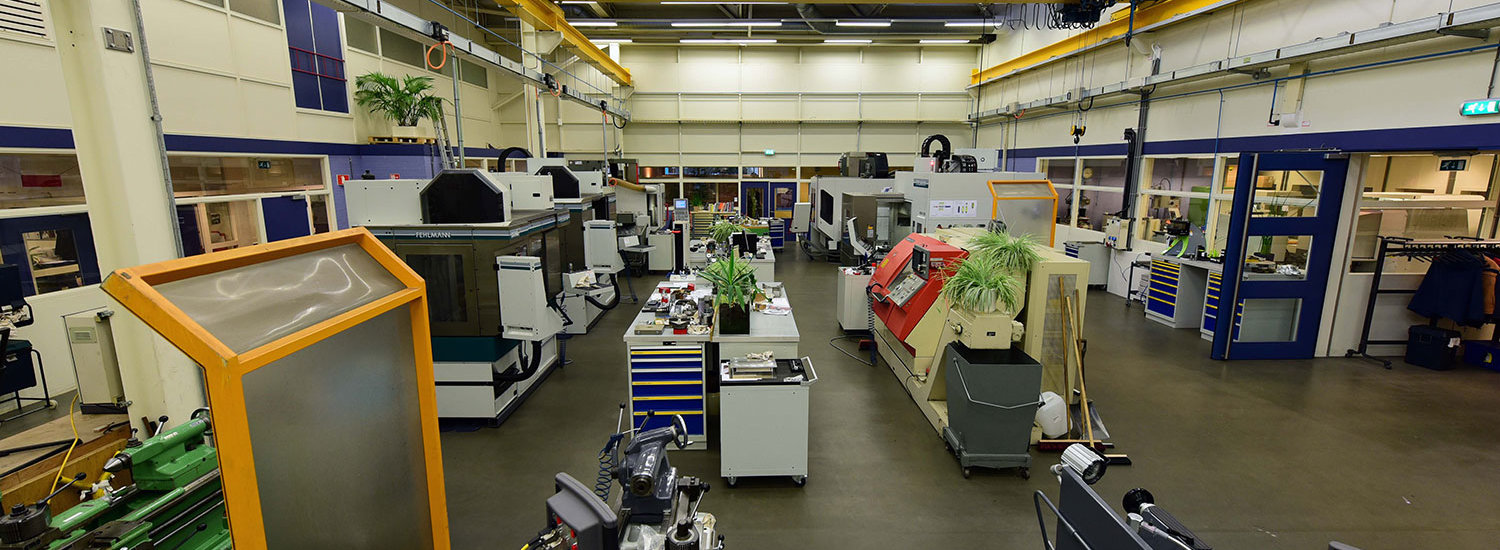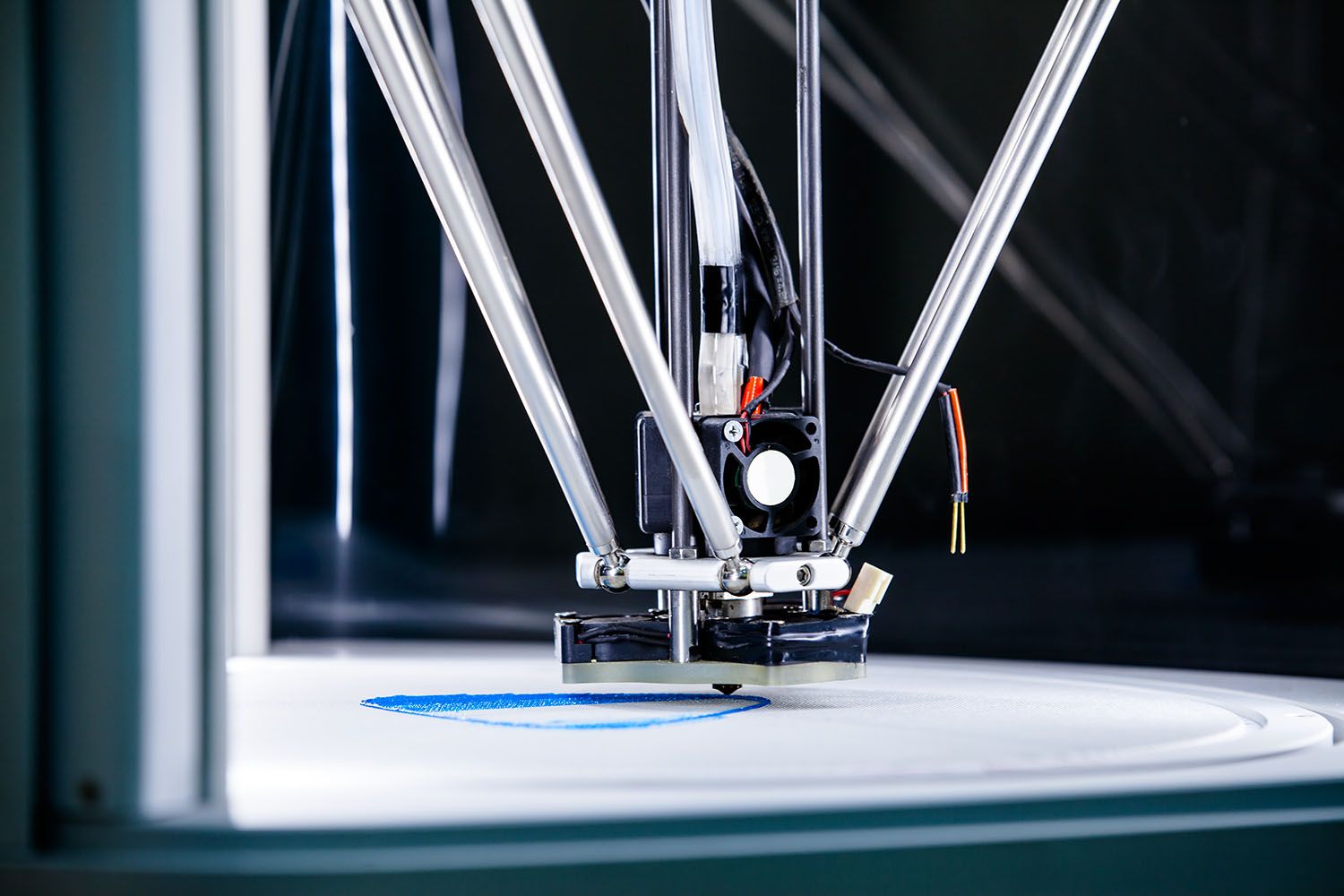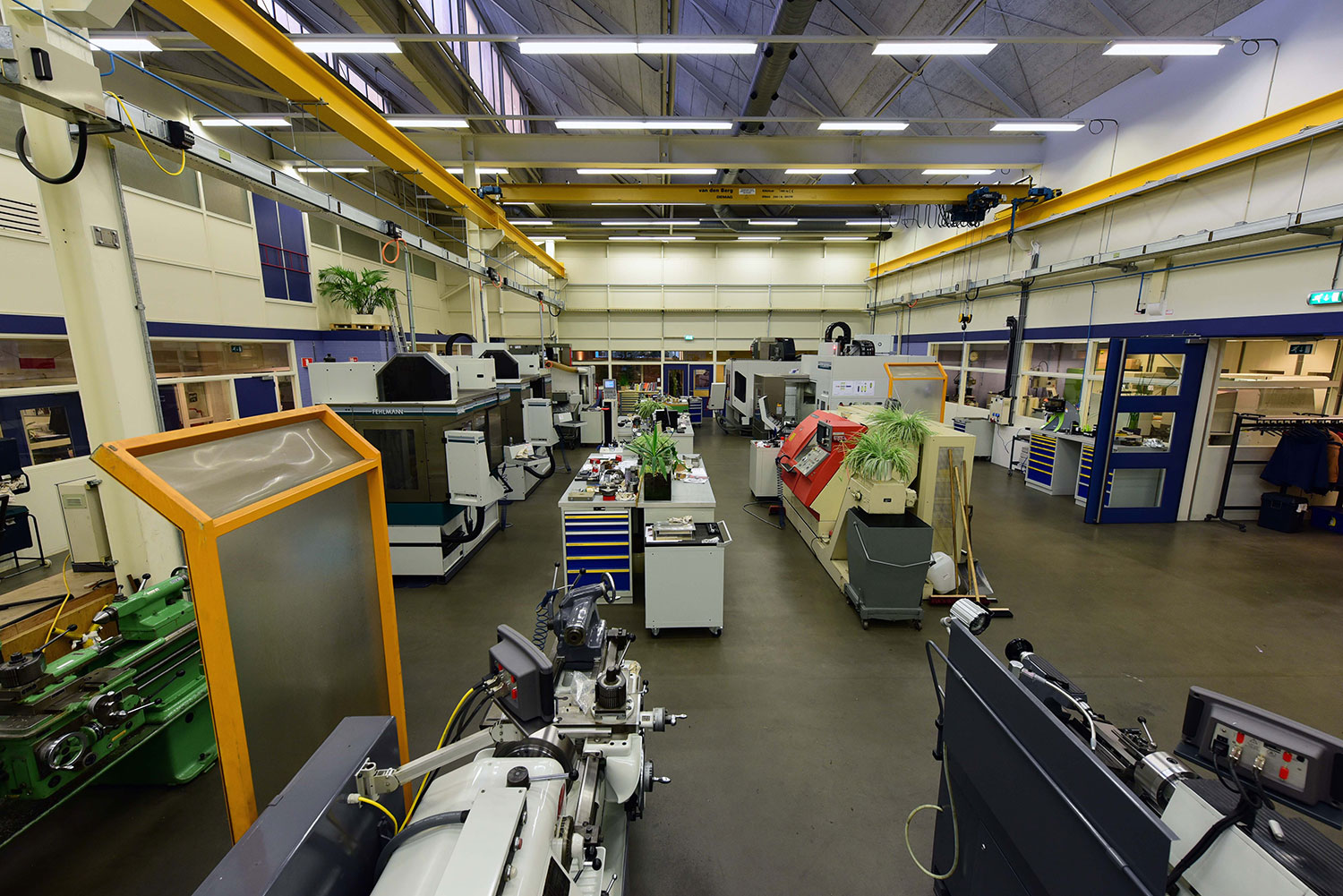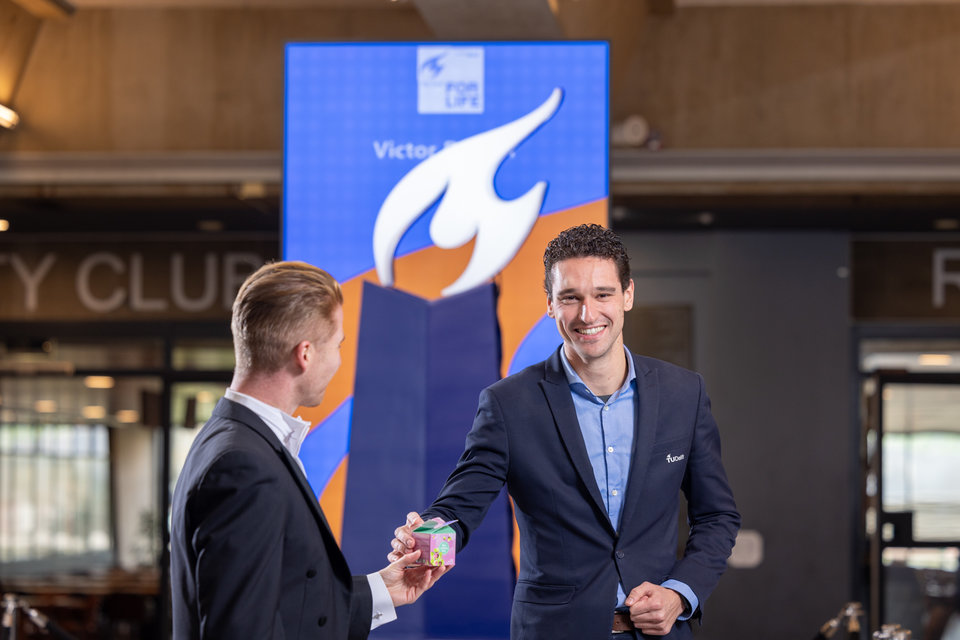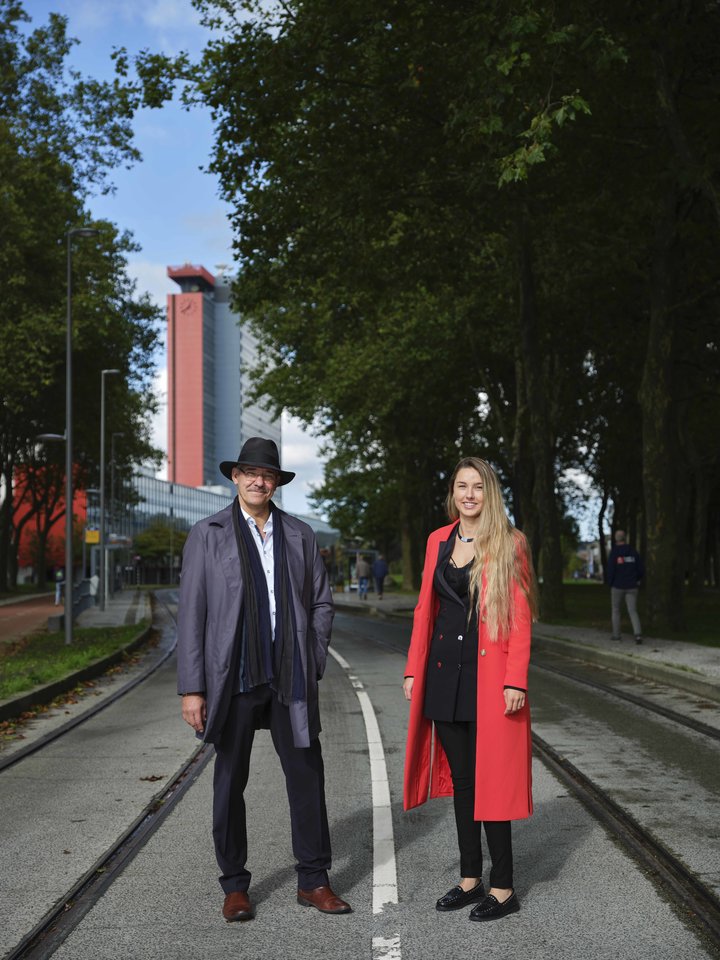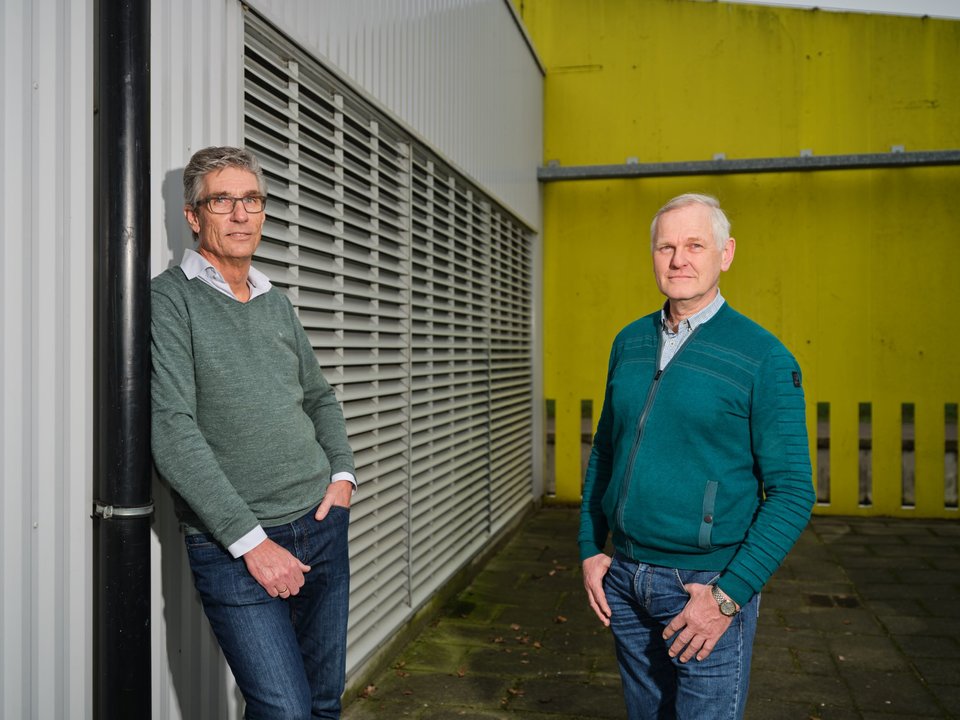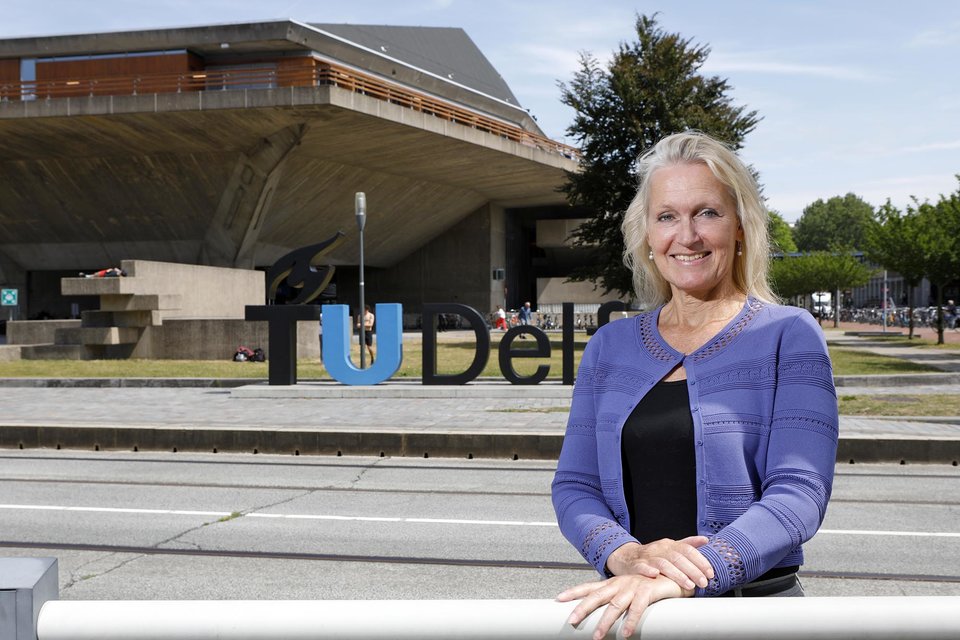Reboot Stories of Support
Before the start of the corona crisis, we spoke to a number of colleagues in the series 'Stories of Support'. How did the crisis affect their work? First up are Ernst van der Wal and Rein van den Oever to talk about their work then and now.
Though the campus was surrealistically quiet, a few weeks into the corona crisis, requests for work were already coming in again at DEMO headquarters. “Researchers have their deadlines, so they have to keep going”, says Rein van den Oever. People at DEMO also have to work from home as much as possible. That is not a problem as long as you are dealing with things like design work, project management, or management tasks, but all the work that requires machinery still has to be done on location. “Fortunately, our hall at EWI is very spacious. We also have a corona protocol, which is primarily a matter of logical thinking: making sure that you regularly disinfect surfaces and items that are used collectively, and that you avoid any risks. We work with a pool system, so that not everyone is present at the same time. When we have to consult with internal customers, we use Skype or get together in our large meeting room.”
False economy
For Ernst van der Wal, work did not slow down either, chiefly because the deadlines for the OYSTER project remained in place. “Our workshop is working at half capacity, but not everyone is able to work from home because not everyone has a laptop. Since we didn't know how long the crisis would last, we didn't invest in that right away. Looking back, that may have been false economy,” he says. Personally, he struggled a bit with his work-life balance. “On my days at the RID I'm busy making sure the workshop is running smoothly. At home I often had to work and look after the children at the same time. That can make you feel that you are doing neither well enough.” Sometimes working from home can also be more efficient, though. “You can continue to design and think about issues for longer, because you don't have any distractions from the lab.”
Eliminate uncertainties
Van den Oever likes to work from home. Nevertheless, he can be found on campus quite often. "I have to manage a lot of people, that's simply not possible via Skype. Walking around the department, you will get all sorts of questions and you can remove uncertainties. I’ve noticed that there is more need for that than before the crisis,” he says. The differences in policy among the various buildings on campus, for example, raise questions. “We have workshops in different buildings, all of which have their own access and opening policies.” While that may be confusing, Van den Oever is glad that no decision was made to close buildings on a massive scale. “It would have made the continuation of our services largely impossible,” he says. Meanwhile, things at DEMO are going well. “I'm proud of how people have found their bearings. We had some start-up problems, but things are running smoothly now."
‘Technical services, but customised and linked to the research.’ This is how Rein van de Oever describes the work of DEMO. Van den Oever is an electronics engineer and the manager of the central DEMO department in the EEMCS building. His colleague, Ernst van de Wal, works in the mechanical field and is the team leader for the RID, one of the decentralised DEMO locations. ‘In practice, however, the locations often cooperate with each other, and we are one big department’, explains Van der Wal. One such example is the OYSTER project, in which the RID reactor is linked to a cold neutron source. ‘I was asked to modify the software for the OYSTER test installation and to help with the instrumentation, because DEMO does not provide standard electro-technical support to the RID’, recounts Van den Oever.
Even though management duties now sometimes have to take priority for Van den Oever, he has worked all over the campus. ‘A year or so ago, I was involved in a project of the Process & Energy department involving the production of artificial meat. The researcher had constructed a sort of mini-reactor for that purpose. The challenge was not so much to get the flavour right, but the structure. I enjoyed seeing all of his efforts in that regard.’ Van der Wal also sees the variety as one of the best aspects of the job. ‘In addition to the RID, I am currently working on proton instruments for the HollandPTC research bunker, where the scientific experiments will be conducted’, continues Van der Wal. ‘I am also working on a process-based solution for extracting salts from waster-water streams. I can’t imagine that I’d be able to work in so many fields at the same time in a company.’
Mini-enterprise
In one respect, DEMO does resemble a company. ‘We operate like a mini-enterprise within TU Delft issuing price quotes and all that. For internal assignments, it’s a little bit like pumping money around from one place to another, but the situation is different for subsidised projects’, explains Van den Oever. ‘Grant proposals are often a highly complicated process. Although researchers know what they want to have in their proposals in terms of content, they aren’t aware of how much work is involved. Because we have experience with this, we can exchange ideas about test installations, as well as about the project organisation.’ Van der Wal; ‘Researchers might develop instruments once every few years. For us, it’s an everyday job. It is relatively easy for us to assess what is and is not feasible. This enhances the researcher’s confidence that it’s really going to work. We can also create a draft blueprint, so that the proposal can include a nice illustration.’
In more than 15 years at TU Delft, Van den Oever has witnessed quite a few developments. ‘In the past, we started with a blank sheet of paper, and we had to develop everything from scratch’, he recalls. ‘Today, there is so much available on the market that we usually build systems out of ready-made components, which we modify or incorporate into the larger unit. For example, consider home-alarm systems. In the past, they were only for rich people. Now you can buy something for less than €50. If we were to build one ourselves at our usual hourly rate, it would be much too expensive. We have to remain cost-conscious.’ For the same reason, contracting out is becoming much more common than it was in the past. ‘We know the best places to do that; this is part of our added value.’
One good example is the research in the Faculty of Aerospace Engineering (AE) on the welding of composites. ‘To do this, they use ultrasonic devices that vibrate very rapidly. This makes it possible to heat the material in place, forming a weld’, explains Van den Oever. ‘Although such devices are available for sale, they often have to be modified to the specific preferences of the researchers. In this case, they wanted to be able to weld seams as well as make spot welds. At DEMO, we therefore worked on the further development of a commercial system available from a German manufacturer. Although its operation was satisfactory, advancing insight has required several changes throughout the course of the research. Because we’re good at that, we are often involved in such projects for a long time.’
3D-printing
Another development is the 3D printing of metal. Van der Wal: ‘3D printing allows much greater freedom in terms of the shape of parts, and this makes it possible to combine functionalities within parts. For example, consider integrated cooling channels. Reducing the number of parts also reduces the likelihood of malfunctions.’ The production process is also simpler. ‘Much more preparation time is needed for milling and turning than for 3D printing. For example, we can print something at night and, the next day, we can consult with the researchers about whether that is the direction they want to go. This interactive collaboration means that we can progress much more quickly in the design process.’
That process has also changed over the years. ‘In the past, most of the work involved making things. Now, our jobs entail much more design, simulation and project management’, observes Van der Wal. He was one of the first TU Delft graduates to start working at DEMO, although their numbers continue to increase. Van den Oever: ‘Having more highly qualified staff members also enhances our ability to exchange ideas about the research. Ideally, we like to be at the table during the brainstorming phase, because we can still guide the researchers in directions that will be feasible in practice. In this regard, we usually have more experience than the researchers do.’ Despite such experience, however, things do not always go right the first time. ‘We're doing everything for the first time: what we make either doesn’t yet exist or not in that form. Otherwise, we would have just bought it’, explains Van der Wal.
Prototype builders
Van den Oever adds, ‘We are prototype builders. For example, the process of building a particle accelerator gradually moves from the brainstorming phase to something concrete. It’s not like tiling a bathroom, where you know what risks to expect beforehand. During development, if we start off in a direction that ultimately leads to a dead end due to advancing insight, we sometimes have to start again from scratch. We have to pass along those costs as well.’ And then there are the legal aspects: ‘A prototype does not have to meet the same requirements and quality standards as objects that are offered in stores, but it does have to be safe. Will it be used on humans? Under what conditions will it be used? Who will be working with it? All of these aspects have to be well considered in advance.’
Other uncertainties can play a role as well. ‘The regulations for medical instruments have changed,’ explains Van der Wal. The Medical Devices Regulation (MDR), the new European law for medical devices, will take effect in May 2020, following a transitional period of three years. ‘Soon, components will have to be fully traceable, and we will also have to be able to explain why we have made specific choices in this regard'.’ So this calls for an entirely new administration. ‘It's part of a learning process. These types of activities are not always easy to charge to our customers. To some extent, we invest in this ourselves’, says Van den Oever.
Often there is understanding for these decisions, but not always. Van der Wal: ‘For one researcher, we act as the colleague who collaborates on everything, while another might approach us from a more business-like perspective and negotiate about the costs’. Van den Oever: ‘This is less of a problem for locations that are in close proximity to faculties. Here at the central department, our internal customers are always changing. The first time, they approach us as an external party who will issue a price quote. Only after a few assignments do we develop a bond of trust with them. Then they understand it better as well. That's the best way to work.’
So both Van den Oever and Van der Wal are the happiest when they are truly involved in the research. ‘The fun part is not only making an instrument, but also seeing that it is used successfully. This also teaches lessons that can be used next time’, says Van den Oever. Van der Wal: ‘Good measurements make me happy. We were both involved in a project of ME and the RID that focused on developing an oven that operates at high temperatures. It’s quite a kick when the first results appear on the screen, and they are what we want them to be.’ Van den Oever: ‘And when we have built something more elaborate that can be used in pioneering research, it’s also a kick to know that we’ve had a hand in it.’
Workload
To get that kick, they are often willing to work just a bit harder. ‘One consequence of feeling connected is that it becomes our own thing, and we want to make it succeed. At times, there can also be a lot of money or prestige at stake. This can generate peak periods in terms of workload. It’s not always a 9-to-5 job, but we can’t let it get out of hand’, adds Van den Oever. ‘Sometimes, a researcher will have only a particular time slot available for working with an instrument, as is the case with the wind tunnels at AE. In terms of workload, it can be problematic to work for so many research groups. Which should have priority? All researchers obviously think that their own research is the most important’, says Van der Wal. The economic climate is making it difficult to fill vacancies, and it is causing long turn-around times for companies. This is increasing the workload even further. They do know of one possible solution: ‘We have to make sure that students are aware of the job opportunities at DEMO. This will hopefully generate a new stream of mechanical and electronic specialists from our own programmes.’
